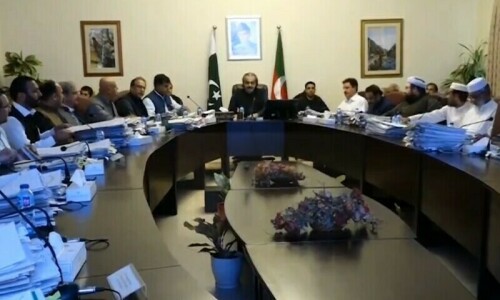
MINGORA: Badeshi, one of the 27 endangered languages of Pakistan, is breathing its last as presently only three persons can speak it, according to experts.
“Badeshi is one of the seven languages of Swat valley. With the death of Badeshi, the world will lose one of the ancient languages,” said language experts. They said that Badeshi was mainly spoken in Bashigram, the far flung mountainous area of Madyan.
Rahim Gul, 70, one of the three speakers of Badeshi who now speaks Torwali and Pashto, told Dawn that only two other elders of Bashigram could speak the language. He said that all other members of Badeshi tribe forgot it and talked in Torwali, a dominant language of the area.
“Since our forefathers married women from other communities like Torwali, they started adopting their language too so our language was gradually forgotten. Now we have only three old men, who can speak it,” he said.
Presently only three elderly persons can speak Badeshi
Mr Gul has a 12-member family but none of them can understand Badeshi language. He said that children laughed at him when he spoke Badeshi. “It is very sad that our language has nearly died but as a poor and illiterate man I can do nothing,” he added.
He also shared some words of his language with this scribe and offered his services for preservation of the language.
According to language activists, 70 languages are spoken in the country but more than half of them are endangered. “I have recorded about 100 words of Badeshi during my field survey.
The language belongs to Indo-Aryan family. It is almost a dead language as we have two or three elderly people, who can speak it,” said Mohammad Zaman Sagar, a language activist and researcher in Kalam.
He said that the language was also spoken in Terat valley of Swat, Puran Chakesar of Shangla and Allai in Battagram district.
Mr Sagar said that there was no authority or institution to work for preservation and documentation of endangered languages.
“In 2011, a bill was passed by the provincial assembly for setting up an authority for promotion and documentation of all the languages of KP, but so far the government has not allotted funds for this cause,” he said.
Zubair Torwali, a research scholar and language activist from Bahrain, said that Badeshi was also known as Badakhshi as Badeshi people claimed that they came from Badakhshan in Afghanistan. “It might be true as this language shares many features with Badakhshani,” he added.
He said that there were 50 to 60 households in Bishigram and their native language was Badeshi.
The language shift from Badeshi to Torwali in Bishigram occurred mainly because of inter-marriages with the Torwali people there, he added.
Mr Torwali said that Badeshi was never written. In schools, majority of the children speak Torwali hence the Badeshi children gradually replaced their language Torwali because of contact and context.
He said that Badeshi was an Indo-Iranian language and its cousin languages in the country were Yidgha and Wakhi. “Yidgha is spoken in Chitral whereas Wakhi is spoken in upper Gojal, Yaisn, Shimshal and Chuperson areas in Gilgit-Baltistan. Wakhi is also spoken in Yakhun area in upper Chitral,” he said.
Mr Torwali said that documentation of Badeshi was a challenge as the elderly people even did not want to speak it.
“We have, however, been trying to build their confidence so that we may be able to record it,” he said and added that no noted research was so far conducted on Badeshi language.
Published in Dawn, January 10th, 2018












































